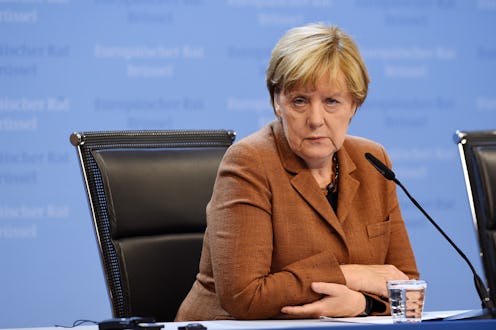News
'TIME's Person Of The Year Sends A Serious Message
The Today Show announced Wednesday that German Chancellor Angela Merkel is TIME's Person of the Year. Merkel is the fourth individual woman to receive the title in the magazine's history, and the first individual woman to receive it since the magazine changed the name from "Man of the Year" to "Person of the Year" in 1999. The magazine said that it selected Merkel because of how she's led the European Union through countless critical crises over the last year — most importantly, in the refugee crisis. TIME's selection of Merkel sends a serious message about leadership and empathy in times of crisis.
In an essay on why Merkel was chosen, TIME managing editor Nancy Gibbs cited Merkel's "steadfast moral leadership in a world where it is in short supply." Merkel grew up in East Germany, and has described the building of the Berlin Wall as her first "political memory." For the next 35 years, Merkel lived within the Soviet satellite state, and grew to learn just what walls and borders meant for people fleeing tyranny.
Gibbs said that one of the reasons Merkel was chosen was because her stance on the refugee crisis was so markedly different than her approach to a number of other issues. She dove headfirst into the refugee crisis, never turning to xenophobia or fear. She realized, maybe partly because she grew up in a region marred by control and division, that war crimes against people in the Middle East affect people in Germany. Merkel gave the following statement when she first began addressing the refugee crisis:
In many regions war and terror prevail. States disintegrate. For many years we have read about this. We have heard about it. We have seen it on TV. But we had not yet sufficiently understood that what happens in Aleppo and Mosul can affect Essen or Stuttgart. We have to face that now.
As leading presidential candidates like Donald Trump, Ben Carson, and Texas Sen. Ted Cruz call for Syrian refugees to be rejected — or only allowed in the U.S. pending a restrictive screening process — TIME's selection of Merkel as Person of the Year is a serious message, and a challenge to the U.S.
In just the last 11 months, Germany has accepted 964,574 new refugees and migrants. More than 200,000 of those came in November alone. Germany has a population of 80 million people, and is one of the wealthiest countries in Europe. The U.S., which is the seventh-wealthiest country in the world, has a population of 320 million and has accepted 675,982 refugees in the past 10 years. The staggering difference is statement enough, but when the amount of space is factored in, it's extremely troubling.
Those numbers, combined with Merkel's attitude toward accepting refugees, make the U.S. look heartless and lazy. Even in the face of the Paris terror attacks, Merkel has stood firm in her decision to allow refugees into Germany:
The strongest response to terrorists is to carry on living our lives and our values as we have until now – self-confident and free, considerate and engaged. We Europeans will show our free life is stronger than any terror ... But simply sealing ourselves off will not solve the problem.
Merkel seems to understand that not allowing refugees to flee terrorists will only force them to take another side. When Europe and the West turn away refugees, they are playing right into the hands of groups like ISIS, which claim that the West and Islam are at war. Merkel, who has also deployed troops to fight ISIS, understands that the problem is not the refugees themselves, and that turning them away could only exacerbate the real threat.
TIME's message to the U.S. could not have been clearer: Being a leader is not always about remaining risk-free. Often, it's about composure in the face of risk:
At a moment when much of the world is once more engaged in a furious debate about the balance between safety and freedom, the Chancellor is asking a great deal of the German people, and by their example, the rest of us as well. To be welcoming. To be unafraid. To believe that great civilizations build bridges, not walls, and that wars are won both on and off the battlefield. By viewing the refugees as victims to be rescued rather than invaders to be repelled, the woman raised behind the Iron Curtain gambled on freedom ... Leaders are tested only when people don’t want to follow.
Too many of the Republican presidential candidates see vulnerability as weakness. In reality, vulnerability is inevitable, especially in crises. Merkel is acting on this vulnerability with a clear head and strength. She is acting as a leader not just for Germany, but for a part of the world which believes people ought to have a shot at a better life. And the U.S. needs to take notice.
